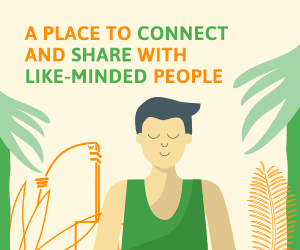Living A Simple Life
Considering escaping the consumer-driven world and living a simpler life? Calvin Holbrook is and he's not alone. Read about the 'voluntary simplicity' movement and discover six benefits of a simplistic lifestyle, including discovering your purpose, better health and increased focus.
Since hitting my 40s, the thought of voluntary choosing to live a simpler life appeals more and more. Living in large and exciting cities has provided great opportunities and entertainment, but what I once found exciting I now find challenging. My brain feels increasingly overwhelmed with noise, excess stimulation, distractions, and ever-increasing crowds, all helping to pump up my anxiety levels.
As a result, I find myself thinking about a quieter, more simplistic way of life, being closer to nature and in a more peaceful setting. However, living the simple life doesn’t have to mean shacking up alone in a log cabin in the middle of nowhere (although, actually, that sounds quite appealing). In fact, there are many practical and not-so-drastic ways to create a more simplistic lifestyle for yourself, and the benefits are proven by science.
Moreover, it seems I’m not alone in thinking this way. So-called 'simple living' or ‘voluntary simplicity' is a recognized lifestyle steeped in history, one that minimizes consumption and the pursuit of wealth and material goods. Individuals choose voluntary simplicity in order to attain a simpler but more meaningful life. Many religious groups, including the monastic orders from the Middle Ages to the modern-day Amish and Quakers include simple living is an essential element of teachings.  Living a simple life: being in nature is one attraction
Living a simple life: being in nature is one attraction
More recently, the modern simplicity movement arose from the counterculture movement in the 1960s and 1970s. Then, in 1981, this movement gained a new moniker with the release of Duane Elgin’s book Voluntary Simplicity. In it, he explained the virtues of “a way of life that is outwardly simple, inwardly rich.” During the 90s, the concept of minimalism, which includes elements of simple living, also became popular.
What does living a simple life involve?
While minimalism is mainly focused on reducing or giving up possessions, living a simple life often includes more elements. Choosing simplification creates a life filled with meaning, a life lived on your own terms. It helps create the time and space to pursue your true interests and passions.
Simple living flies in the face of the common values of the Western world most of us have grown up with. Living a simple life means stripping away the nonessential stuff to focus your time and energy on the things that matter the most to you.
How can I simplify my life?
As I mentioned at the start, moving away for a simple, quieter life in the countryside or coast is a dream for me and many others. However, the reality is, many cannot just jump and do that because of work or family commitments. But, in the meantime – and regardless of where you're living – there are many practical steps you can take to simplify your life and feel the benefits.
“Living a simple life doesn’t just mean giving up your possessions. Choosing simplification creates a life filled with meaning, a life lived on your own terms.”
Examples include reducing your possessions, being mindful of new purchases, limiting your time on social media and smartphones, stopping attending social occasions you’re indifferent about and eliminating multitasking. Doing some or all of these things can bring you great benefits and happiness – so, let’s take a more detailed look at these six key benefits of simplifying your life, backed up by science.
1. Simplify your life to learn more about yourself
When you’re not distracting yourself with social media, binging on Netflix series, shopping for another gadget, or filling your diary with must-do events, you’re giving yourself the time and mental space to be grateful for what you already have, plus providing the opportunity to reflect and learn more about yourself.
In fact, living simply can help us find meaning and grow spiritually, as it shifts the focus away from material possessions and helps us to look inwardly. It helps to create more silence – and even solitude – prime factors for spiritual reflection.
Of course, sometimes reflecting on our lives and who we are can be as uncomfortable as it is rewarding, but ultimately it helps to focus on who we are, what gives our life purpose and meaning, and what we want to do with the rest of our lives. In turn, living with purpose and a meaningful life has been to shown to increase happiness levels.
2. A simpler lifestyle can improve relationships
In his essay Voluntary Simplicity: Characterization, Select Psychological Implications, and Societal Consequences, Amitai Etzioli argues that when we stop focusing our time on acquiring material possessions, we’re more likely to focus on relationships. Likewise, spending excessive time on social media or being occupied all the time can mean other relationships suffer. If we reduce or remove these things we free up more time to spend with friends and family. A simple life can improve your relationships
A simple life can improve your relationships
Additionally, developing a more simple way of life may mean editing your friendship group. Perhaps you have lots of different friends that you spend time doing different actives with, for example, the 'party' friend, the 'shopping' friend, the 'gym buddy'. By simplifying your life and doing less, it could mean shifting your focus to having fewer, more quality friendships and closer relationships. The interaction between you may also be more sincere, as you will be free of the need to impress.
In turn, there are health benefits attached to simplifying your friendships. Various studies have found that developing strong, solid friendships can reduce your illness risk – from being less likely to get a common cold to having a lower risk of developing obesity or heart disease. A Harvard study also found that keeping close friends could promote brain health as we grow older.
3. Simple living boosts your bank balance
In many developed countries, the disparity between what we buy and what we need leads to huge overconsumption that drains the Earth’s resources and accelerates climate change. Voluntary simplicity is a lifestyle that minimizes consumption and the pursuit of wealth and material goods.
Simplifying your life by reducing consumption means you will spend (and owe) less, and the benefits of financial independence can include less stress and worry, and consequently better sleep. That could benefit a lot of people: according to a UK study from 2018 which questioned 2,000 people, money worries affect 40 per cent of the population.
“Living a simple life means stripping away the non-essential stuff to focus your time and energy on the things that matter the most to you.”
To limit your consumption, firstly, take time to look at your outgoings and consider what you need to spend your money on. Those daily takeaway coffees? Upgrades to the latest iPhone or Samsung? Netflix and apps subscriptions? That gym membership you hardly ever use? There are so many chances to minimize our spending, so cancel what you don’t need and change your habits. Additionally, you may be being charged for subscriptions for things you’ve totally forgotten about, so go through your bank statement and check.
Secondly, aim to eliminate any existing debt you have and only live within your means. Stop using credit cards and, instead, develop a monthly budget. Thirdly, if you’ve decided to simplify your belongings, make yourself some extra money by selling unwanted stuff on eBay (or donate it to charity, of course).
Likewise, if you decide to simplify your social life to focus on things such as connecting with nature, walking, meditation, this will also benefit your bank balance – most of these things are free or have little expenditure involved!
4. Living a simple life is great for your health
Living a simplistic lifestyle can also be beneficial to your physical and mental health. A 2014 study published in the Journal of Personality and Social Psychology found a link between materialism (valuing possessions and money) – and poor physical health. The team, from Knox College, Illinois, also found an even stronger link between materialism and engagement in risky behaviors that could damage physical health, including drinking alcohol, smoking and drug use. So, it makes sense that the reverse – having a non-materialistic attitude – could be positive for health.
This theory was backed up in an unpublished survey from the University of the Sciences in Pennsylvania. It found that 90 per cent of people who identified as coming from the simple living movement reported improved physical health after choosing to make a change to earn less money. Almost as many respondents also claimed that their mental health had improved. Simple living in the country © shutterstock/Monkey Business Images
Simple living in the country © shutterstock/Monkey Business Images
The reasons for this could be due to the fact that developing a more simplistic lifestyle often means less stress and increased rest. This benefits could come from spending more time with friends/family, getting more physical activity, and changing jobs to find something more fulfilling and less money-orientated.
Additionally, voluntary simplifiers often make a move away from big urban hubs to the countryside or seaside, which also has potential health benefits. A 2012 study from the University of Exeter showed that coastal populations in the UK are healthier than those inland, believed to be party due to the stress relief of living by the sea and greater opportunities for physical activity. The coast also offers cleaner, healthier air which helps to promote better sleep (which we know is essential for good mental health).
5. Simplistic living means increased focus
Reducing possessions and commitments correlates to a reduction in distractions and therefore less physical – and mental – clutter. As you simplify your life and remove distractions, you create space to breathe and focus more carefully on what remains.
RELATED: The Top 5 benefits of gratitude practice
In fact, the physical reduction of clutter in your home has been proven to boost concentration. Researchers at the Princeton University Neuroscience Institute studied the effects of clutter and published the results in the Journal of Neuroscience. They concluded that clearing clutter from your home and work environments increased the ability to focus and process information effectively. Their research also showed that an uncluttered space led to people feeling less irritable, more productive and distracted less often.
“Living simply can help us find meaning and grow spiritually, as it shifts the focus away from material possessions and helps us to look inwardly.”
Simplifying your life by focusing on one job at a time, rather than multitasking, can also boost concentration. Multitasking used to be championed as effective, but Psychology Today reports that in reality it can decrease productivity levels by up to 40 per cent.
Many of us are constantly switched on to multiple technologies: on average, we check our mobile phones every 12 minutes, causing further distractions and interruptions which affect our ability to concentrate. Choose to simplify life by limiting these interruptions: remove or reduce social media usage and switch off annoying pop-up notifications.
6. Living a simple life helps the environment
While the benefits of voluntary simplicity described here are clear for the individual, simple living also works for the wider environment. It’s been previously suggested that if everyone on Earth consumed as much as the average US citizen, four Earths would be needed to sustain them. Consuming less and having fewer possessions decreases the amount of waste a person produces.
In fact, there are many practical ways you can change you habits to live more simply and help the environment. Buying less clothes is a great place to start. Thanks to fast fashion, the textile industry is now one of the biggest environmental polluters and consumes energy throughout the supply chain. Recycle or donate old clothing © shutterstock/wavebreakmedia
Recycle or donate old clothing © shutterstock/wavebreakmedia
Humans consume 400 per cent more clothes than they did just two decades ago. About 80 billion pieces of clothing are consumed annually, and the U.S.A alone produces 11 million tons of textile waste each year. So, instead of buying cheap fashions, seek out more durable outfits that will last, and if they no longer fit, place unwanted clothes in a material recycling bin; never just throw them away.
There are many other ways cutting consumption and waste helps to protect the environment. For example, instead of buying bottled water, buy a reusable flask. Instead of updating to the latest technology, enjoy what you currently have.
As consumers we rarely consider the context and impact when buying products, for example, considering the workers and factories that made a product, the journey to the store a product made, how the packaging was produced, etc. Living a simple life means becoming more mindful of what you consume and thinking more about a product’s journey and environmental impact, therefore making more considered purchases.
Conclusions on simple living
According to the Chinese philosopher Confucius, “Life is really simple but we insist on making it complicated.” I would have to agree. For me, it's clear these science-backed benefits of living a simpler life are enormous and can only add to increased happiness too.
Simple living and sustainable living go hand-in-hand, and having a healthier environment will also lead to better health for generations to come. Rather than buying more and more possessions, consider spending more of your time and money on experiences: they leave only memories and nothing in the trash can!















































![[ℕ𝕖𝕧𝕖𝕣] 𝕊𝕖𝕝𝕝 𝕐𝕠𝕦𝕣 𝔹𝕚𝕥𝕔𝕠𝕚𝕟 - And Now What.... Pray To The God Of Hopium?](https://cdn.bulbapp.io/frontend/images/79e7827b-c644-4853-b048-a9601a8a8da7/1)




